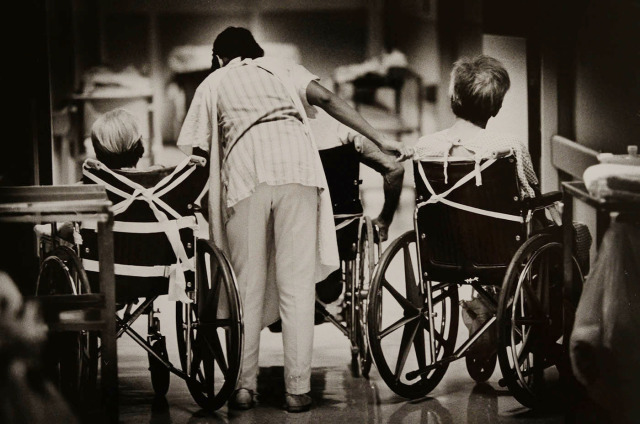by Zedrick-Kyle Oda. This article originally appeared in Honolulu Civil Beat.
Within my big family, I always viewed my 87-year-old great grandmother and my 94-year-old great grandfather as strong-willed individuals. They’re always so loving to their children and to us grandchildren.
Everything seemed to be fine until the reality of time gradually caught up with them. As they lived with my 64-year-old grandmother throughout much of their lives, they’ve become more dependent on her over time.
My great grandfather has gradually lost his ability to walk and has developed a case of dementia. Also, my great grandmother has a harder time carrying out her daily routine due to her old age. Given that my grandmother worked full-time and had to take care of them, it has made her life much more difficult.
However, to address this issue we had to move my great grandfather to my aunty’s care home during the past couple of years in order to ensure that he still receives proper care. Although he is being taken care of by my aunty, she is not receiving any money to cover his expenses. Therefore, she must sacrifice her own money to take care of him.

photograph Cory Lum/Civil Beat
Also, my aunty is a certified care giver who takes care of two other private patients and one Medicaid patient within her care home as well. Unfortunately, the income from these patients does not equate to the amount of work she has invested.
She is only given a monthly wage of $1,354 for the Medicaid patient and $4,500 for the two private patients. The low wage from her Medicaid patient is barely enough to cover some expenses. Also, the wage from the private patients are distributed to meet the rest of her bills as well as the expenses for my great grandfather.
A potential solution to this problem is the Kupuna Care Assistance Bill. Access to a $70-a-day fund would be a great help to my aunty, my great grandfather, and the rest of her patients. Overall, among the caregivers in our community she states “we really are underpaid for the constant 24/7 care we provide.”
Also, she has no time for herself because as she says in her own words “the work never ends.” Being able to pay for additional help on some days would be a great relief.
In regards to my great grandmother, she just recently had a stroke that paralyzed half of her entire body. This was a very terrifying experience for my family, myself, and especially my grandmother.
Following this event, my grandmother and the rest of my family now take turns to look after my great grandmother. She is currently on her way to recovery in a nursing home in Hilo.
Although she is gradually recovering, a big contribution to that is from my grandmother. She confronts the difficulties of working a full-time job and taking care of my great grandmother simultaneously by sacrificing her free time.
My grandmother states that she goes to the nursing home “every day after work to feed her, exercise her, change her diaper, and do other duties a certified nurse must do.”
Also, my grandmother is committed to sacrificing her free time to take care of her because she knows that the quality of care that my great grandmother receives would greatly decline if she wasn’t there. The nurses that work at the nursing home have 10 to 15 other patients to look after, which means they must divide and thinly spread their attention to the other elderly. This creates a disconnect between the nurses and their patients.
In my great grandmother’s case, nurses only tend to her four times a week for an hour a day. Therefore, my grandmother constantly visits my great grandmother to motivate her through her motor skill exercises and provide care for her which makes the whole situation more intimate.
Unfortunately, since my grandmother tries her best to compensate for the times that the nurses aren’t there, it has taken a physical and mental toll on her. This leads to her not getting a good night’s rest because she must wake up early for her job and go home late due to her time spent with my great grandmother. Also, this affects her performance at work by not being able to focus on her tasks due to the lack of sleep.
Although my family must sacrifice their time and effort to take care of my grandparents, it’s a part of our culture to take pride in doing so. We value our familial relationships a lot and must do whatever it takes to maintain that bond.
However, there are elderly people in our community who aren’t as fortunate to rely on family. My grandmother feels sorry for the other elderly patients who don’t have any family members to visit them and take care of them. This makes me empathize with them because they must feel neglected and abandoned. It is very sad to know that this is occurring in our society and we should raise awareness of this issue in order for us to do something about it.
In conclusion, all of these issues could begin to be resolved with the Kupuna Care Assistance Bill. With this bill, many of our elderly will have an increased chance of being taken care of properly by a certified caregiver.
Also, this will provide respite for those who have had the responsibility of taking care of their elders, like my grandma who are old themselves. This could potentially allow my aunty to take care of my great grandmother after her recovery. Furthermore, this will provide financial aid for a lot of other families that are going through a similar situation and will have that extra help they need to keep their family together.
The opinions expressed in this article are those of the author and do not necessarily reflect those of the Diverse Elders Coalition.

